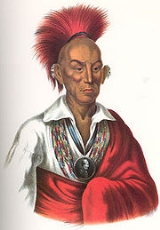
Black Hawk War
Overview
1832 in the United States
-Incumbents:* President: Andrew Jackson * Vice President: John C. Calhoun , vacant * Chief Justice: John Marshall...
between the United States and Native Americans
Native Americans in the United States
Native Americans in the United States are the indigenous peoples in North America within the boundaries of the present-day continental United States, parts of Alaska, and the island state of Hawaii. They are composed of numerous, distinct tribes, states, and ethnic groups, many of which survive as...
headed by Black Hawk, a Sauk leader. The war erupted soon after Black Hawk and a group of Sauks, Meskwaki
Meskwaki
The Meskwaki are a Native American people often known to outsiders as the Fox tribe. They have often been closely linked to the Sauk people. In their own language, the Meskwaki call themselves Meshkwahkihaki, which means "the Red-Earths." Historically their homelands were in the Great Lakes region...
s, and Kickapoos known as the "British Band
British Band
The British Band was a group of Native Americans which fought against Illinois and Michigan Territory militia units during the 1832 Black Hawk War. The band was composed of about 1,500 men, women, and children from the Sauk, Meskwaki, Fox, Kickapoo, Potawatomi, Ho-Chunk, and Ottawa nations;...
" crossed the Mississippi River
Mississippi River
The Mississippi River is the largest river system in North America. Flowing entirely in the United States, this river rises in western Minnesota and meanders slowly southwards for to the Mississippi River Delta at the Gulf of Mexico. With its many tributaries, the Mississippi's watershed drains...
into the U.S. state of Illinois
Illinois
Illinois is the fifth-most populous state of the United States of America, and is often noted for being a microcosm of the entire country. With Chicago in the northeast, small industrial cities and great agricultural productivity in central and northern Illinois, and natural resources like coal,...
in April 1832. Black Hawk's motives were ambiguous, but he was apparently hoping to avoid bloodshed while resettling on land that had been ceded to the United States in a disputed 1804 treaty.
American officials, convinced that the British Band was hostile, mobilized a frontier army.
Discussions

